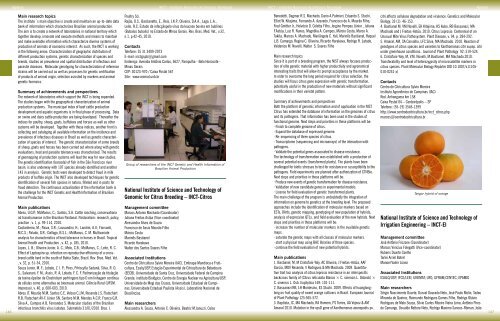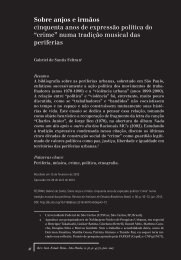livro
livro
livro
Create successful ePaper yourself
Turn your PDF publications into a flip-book with our unique Google optimized e-Paper software.
Agrárias INCT – Institutos Nacionais de Ciência e Tecnologia<br />
INCT – Institutos Nacionais de Ciência e Tecnologia<br />
Agrárias<br />
Main research topics<br />
The institute´s main objective is create and maintain an up-to-date data<br />
bank of information which characterizes Brazilian animal production.<br />
The aim is to create a network of laboratories in national territory which<br />
together develop, innovate and execute methods and means to maintain<br />
and make available information which characterize diverse systems of<br />
production of animals of economic interest. As such, the INCT is working<br />
in the following areas: Characterization of geographic distribution of<br />
different production systems, genetic characterization of species and<br />
breeds, studies on prevalence and spatial distribution of infectious and<br />
parasite diseases. Molecular genotyping for characterization of reference<br />
strains will be carried out as well as processes for genetic certification<br />
of products of animal origin, selection assisted by markers and animal<br />
genetic forensics.<br />
Summary of achievements and perspectives<br />
The network of laboratories which support the INCT is being expanded.<br />
The studies began with the geographical characterization of animal<br />
production systems. The municipal index of beef cattle production<br />
development and aquatic organisms is in final phase of processing. Data<br />
on swine and dairy cattle production are being developed. Thereafter the<br />
indices for poultry, sheep, goats, buffaloes and horses as well as other<br />
systems will be developed. Together with these indices, another front is<br />
collecting and cataloging all available information on the incidence and<br />
prevalence of infectious diseases in Brazil as well as genetic characterization<br />
of species of interest. The genetic characterization of some breeds<br />
of sheep, goats and horses has been carried out where along with genetic<br />
evaluations, heat and parasite tolerance was characterized. The results<br />
of geomapping of production systems will lead the way for new studies.<br />
The genetic identification (barcode) of fish in the São Francisco river<br />
basin, is also underway with 107 species already identified and another<br />
143 in analysis. Genetic tests were developed to detect fraud in milk<br />
products of buffalo origin. The INCT also developed techniques for genetic<br />
identification of several fish species in natura, filleted and in posts for<br />
fraud detection. The continuous actualization of the information bank is<br />
the challenge for the INCT Genetic and Health Information of Brazilian<br />
Animal Production.<br />
Poultry Sci.<br />
Rajão, D.S., Bastianetto, E., Reis, J.K.P., Oliveira, D.A.A., Lago, L.A.,<br />
Leite, R.C. Estudo da infecçãopelo vírus da leucose bovina em bublinos<br />
(Bubalus bubalis) no Estado de MInas Gerais. Rev. Bras. Med. Vet., v.32,<br />
n.1, p.42-45, 2010.<br />
Contacts<br />
Telefone: 55 31 3409-2073<br />
E-mail: inctigspb@gmail.com<br />
Endereço: Avenida Antônio Carlos, 6627, Pampulha - Belo Horizonte -<br />
Minas Gerais<br />
CEP: 30123-970 / Caixa Postal 567<br />
Site: www.animal.unb.br<br />
Group of researchers of the INCT Genetic and Health Information of<br />
Brazilian Animal Production<br />
National Institute of Science and Technology of<br />
Genomic for Citrus Breeding – INCT-Citros<br />
Benedetti, Dagmar R.S. Machado, Dario A.Palmieri, Eduardo S. Stuchi,<br />
Elliot W. Kitajima, Fernando A. Azevedo, Francisco de A. Mourão Filho,<br />
Fred Gmitter Jr., Helvécio D. Coletta Filho, Jorgino Pompeu Júnior , Juliana<br />
F.Astúa, Luiz R. Nunes, Magnólia A. Campos, Márcio Costa, Marco A.<br />
Takita, Marcos A. Machado, Mariângela C. Yali, Marinês Bastianel, Raquel<br />
L.B. Camargo, Regina C. Oliveira, Ricardo Harakava, Rodrigo R. Latado,<br />
Valdenice M. Novelli, Walter S. Soares Filho<br />
Main research topics<br />
Since it is part of a breeding program, the NIST always focuses production<br />
of elite genetic material with higher productivity and agronomical<br />
interesting traits that will allow its prompt acceptance by the market.<br />
In order to overcome the long period required for citrus selection, the<br />
studies will focus citrus gene expression with genetic transformation,<br />
potentially useful in the production of new materials without significant<br />
modifications in their varietal pattern.<br />
Summary of achievements and perspectives<br />
Both the platform of genomic information and of application in the NIST<br />
Citrus has extended the database of information on the genomes of citrus<br />
and its pathogens. That information has been used in the studies of<br />
functional genome. Next steps and priorities in these platforms will be:<br />
· Finish to complete genome of citrus.<br />
· Expand the database of expressed genome.<br />
· Re-sequencing of three species of citrus.<br />
· Transcriptome (sequencing and microarrays) of the interaction with<br />
pathogens.<br />
· Validate the potential genes associated to disease resistance.<br />
The technology of transformation was established with a production of<br />
several potential events (transformed plants). The plants have been<br />
challenged for biotic stresses to test for resistance or susceptibility to the<br />
pathogens. Field experiments are planned after authorization of CTNBio.<br />
Next steps and priorities in these platforms will be:<br />
· Produce new events of genetic transformation for disease resistance.<br />
· Validation of new candidate genes in experimental models.<br />
· License for field evaluation of genetic transformed plants.<br />
The main challenge of the program is undoubtedly the integration of<br />
information on genome to genetics at the breeding level. The proposed<br />
approaches include the identification of molecular markers based on<br />
ESTs, DArts, genetic mapping, genotyping of new population of hybrids,<br />
analysis of expression QTLs, and field evaluation of the new hybrids. Next<br />
steps and priorities in these platforms will be:<br />
· increase the number of molecular markers in the available genetic<br />
maps.<br />
· saturate the genetic maps with all classes of molecular markers.<br />
· start a physical map using BAC libraries of three species.<br />
· continue the field evaluation of new potential hybrids.<br />
citri affects cellulose degradation and virulence. Genetics and Molecular<br />
Biology, 33 (1): 46-153.<br />
4. Bastianel M, VM Novelli, EK Kitajima, KS Kubo, RB Bassanezi, MA<br />
Machado and J Freitas-Astúa. 2010. Citrus Leprosis: Centennial of an<br />
Unusual Mite Virus Pathosystem. Plant Disease, v. 94, p. 284-292.<br />
5. Amaral, AM, SA Carvalho, LFC Silva, MA Machado. 2010. Reaction of<br />
genotypes of citrus species and varieties to Xanthomonas citri supsp. citri<br />
under greenhouse conditions.. Journal of Plant Pathology 92: 519-524.<br />
6. Cristofani-Yaly, M, V.M. Novelli, M.Bastianel, MA Machado.2010.<br />
Transferability and level of heterozygosity of microsatellite markers in<br />
citrus species. Plant Molecular Biology Repórter DOI 10.1007/s11105-<br />
010-0241-x)<br />
Contacts<br />
Centro de Citricultura Sylvio Moreira<br />
Instituto Agronômico de Campinas (IAC)<br />
Rod. Anhanguera km 158<br />
Caixa Postal 04 – Cordeirópolis – SP<br />
Telefone: (55-19) 3546-1399<br />
http://www.centrodecitricultura.br/inct_citros.php<br />
marcos@centrodecitricultura.br<br />
Tangor hybrid of orange<br />
Main publications<br />
Management committee<br />
Abreu, U.G.P.; McManus, C.; Santos, S.A. Cattle ranching, conservationa<br />
nd transhumance in the Brazilian Pantanal. Pastoralism: research, policy,<br />
Marcos Antonio Machado (Coordinator)<br />
Juliana Freitas Astúa (Vice-coordinator)<br />
National Institute of Science and Technology of<br />
practice , v. 1, p. 99-114, 2010.<br />
Castanheira, M.; Paiva, S.R.; Louvandini, H.; Landim, A.V.; Fiorvanti,<br />
Alessandra Alves de Souza<br />
Francisco de Assis Mourão Filho<br />
Irrigation Engineering – INCT-EI<br />
M.C.S.; Paludo, G.R.; Dallago, B.S.L.; McManus, C. M. Multivariate Márcio Costa<br />
analysis for characteristics of heat tolerance in horses in Brazil. Tropical Marinês Bastianel<br />
Management committee<br />
Animal Health and Production , v. 42, p. 185, 2010.<br />
Ricardo Harakava<br />
José Antônio Frizzone (Coordinator)<br />
Lopes, L. B.; Oliveira Junior, A. C.; Melo, C.B.; McManus, C.; Leite, R. C. Walter dos Santos Soares Filho<br />
Marcos Vinicius Folegatti (Vice-coordinator)<br />
Effect of Leptospira sp. infection on reproductive efficiency of a cross-<br />
Rubens Duarte Coelho<br />
breed cattle herd in the south of Bahia State, Brazil. Rev. Bras. Med. Vet. Associated Institutions<br />
Main publications<br />
Tarlei Arriel Botrel<br />
, v. 32, p. 51-54, 2010.<br />
Centro de Citricultura Sylvio Moreira (IAC), Embrapa Mandioca e Fruti-<br />
1. Bastianel, M, M Cristofani-Yaly, AC Oliveira, J Freitas-Astúa, AAF Manoel Valnir Júnior<br />
Souza Junior, M. F.; Lobato, Z. I. P.; Pires, Prhiscylla Sadanã; Silva, R. O. cultura, Esalq/USP, Estação Experimental de Citricultura de Bebedouro<br />
Garcia, MDV Resende, V Rodrigues & MA Machado. 2009. Quantita-<br />
S.; Salvarani, F. M.; Assis, R. A; Lobato, F. C. F. Padronização da titulação (EECB), Universidade de Santa Cruz, Universidade Federal de Campina<br />
tive trait loci analysis of citrus leprosis resistance in an interspecific Associated Institutions<br />
da toxina épsilon de Clostridium perfringens tipo D em linhagem contínua Grande, instituto Biológico, Centro de Energia Nuclear na Agricultura/USP,<br />
backcross family of (Citrus reticulata Blanco × C. sinensis L. Osbeck) × ESALQ/USP; IFCE/LEEI; UNEMAT; UFG; UFRAM;CENTEC; EPAMIG<br />
de células como alternativa ao bioensaio animal. Ciência Rural (UFSM. Universidade de Mogi das Cruzes, Universidade Estadual de Campi-<br />
C. sinensis L. Osb. Euphytica 169: 101-111.<br />
Impresso), v. 40, p. 600-603, 2010.<br />
nas, Universidade Estadual Paulista (Assis), Laboratório Nacional de<br />
2. Bassanezi RB, LH Montesino, ES Stuchi. 2009. Effects of huanglong- Main researchers<br />
Abreu JT, Mourão M.M, Santos C.E, Veloso C.J.M, Resende J.S, Flatschart Biociências.<br />
bing on fruit quality of sweet orange cultivars in Brazil. European Journal Sérgio Nascimento Duarte, Durval Dourado Neto, José Paulo Molin, Tadeu<br />
R.B, Flatschart ÁV-F, Júnior SN, Santoro M.M, Mendes A.C.R, Franco G.R,<br />
of Plant Pathology 125:565-572.<br />
Miranda de Queiroz, Raimundo Rodrigues Gomes Filho, Rodrigo Otávio<br />
Silva A., Campos A.B, Fernandez S. Molecular studies of the Brazilian Main researchers<br />
3. Baptista, JC, MA Machado, RA Homem, PS Torres, AA Vojnov & AM Rodrigues de Melo Souza, Sílvio Carlos Ribeiro Vieira Lima, Antônio Pires<br />
146<br />
infectious bronchitis vírus isolates. Submetido 31/01/2010. Braz. J. Alessandra A. Souza, Antonio C. Oliveira, Beatriz M.Januzzi, Celso<br />
Amaral 2010. Mutation in the xpsD gene of Xanthomonas axonopodis pv. de Camargo, Osvaldo Rettore Neto, Rodrigo Maximo Sances-Róman, João<br />
147



